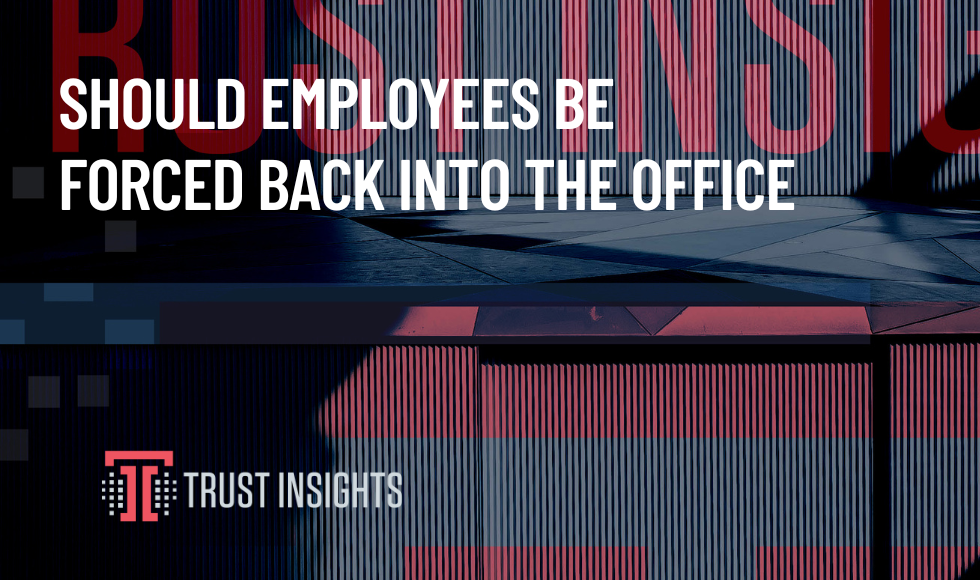Should employees be forced back into the office? This has been a polarizing topic with supporters on both sides of the discussion. If I had to take a wild guess, I would assume you’ve seen the emails from Elon Musk stating that employees must work a minimum of 40 hours a week, not remote.
“Everyone at Tesla is required to spend a minimum of 40 hours in the office per week. Moreover, the office must be where your actual colleagues are located, not some remote pseudo office. If you don’t show up, we will assume you have resigned.”
Read the full article here: https://electrek.co/2022/06/01/elon-musk-tesla-employees-come-back-office-or-quit/
On the other hand, I was reading research from McKinsey that stated that mental health support is sorely lacking – but vitally important.
“Employees need, and increasingly demand, resources to help them cope with mental health problems. If companies make mental health services more accessible and intervene in the workplace in ways that improve well-being, they will simultaneously make investments that will provide real improvements in employee outcomes and consequently in company performance.”
Read the full article here: https://www.mckinsey.com/industries/healthcare-systems-and-services/our-insights/mental-health-in-the-workplace-the-coming-revolution
So, what does one have to do with the other?
When I worked for a company that demanded everyone be in-person and work a minimum of 40 hours a week I was stressed out. I was anxious. I was depressed. I spent almost two hours sitting in traffic to get to the office. Then another six-to-seven hour a day in meetings, leaving one hour to get any actual work done. This often meant that I would stay at the office an extra few hours to catch up, and then spent two hours driving home. Quick math – that makes a 15-16 hour day. That left me zero time for anything else. By the time the weekend rolled around I was too exhausted to do much of anything, let alone address my mental health. To that point, there aren’t a lot of medical and mental health practices available on the weekends if it’s not an emergency.
Long story short, My commute was contributing to the depression and anxiety I was feeling from a toxic workplace. And it was the hours I was being forced to keep that did not allow me to address my mental health.
There is no shortage of research around work/life balance, mental health, and remote work benefits. It all points to we (people) are anxious, tired, and burnt out. Demanding even more of us is not going to get good results. If your employees are forced back into the office you have to know that not all of us are excited about it.
I was talking with a client the other day and they are having a lot of staff turnover in rapid succession. They are struggling to backfill the open positions so the remaining team members are being asked to take on more and more responsibility. And then those team members leave, perpetuating the issue.
Back to Elon. You can (and I have) argued both sides of his commentary. Remove Elon from the equation and think about any employer you’ve worked for. People should be doing the work they are paid to do. Not everyone is productive when they are remote. I get it. There are always going to be exceptions that make a rule hard to enforce. On the other hand, when I think about my previous life and my sixteen-hour days (which didn’t include cooking, cleaning, having a personal life, and appointments) I bristle when thinking about those employer demands.
In the case of Elon, he’s totally in the wrong. His actions don’t match his words. He is taking a 23B bonus. He’s incredibly out of touch. So take his demands with a grain of salt.
So what do we, the employees, do?
As an employer, you can ask whatever you want of your employees. You can decide that you want employees back into the office. However, you have to deal with the consequences if it doesn’t align with what your employees can give. As an employee, you can choose to not work for someone that doesn’t support what you need. However, and this is a hard pill to swallow, you may not ever find your perfect position so you may need to re-evaluate what is critically important and what is nice to have.
You can read the companion Data Diaries here: https://www.trustinsights.ai/blog/2022/08/commuting-and-its-toll-on-workers/
|
Need help with your marketing AI and analytics? |
You might also enjoy: |
|
Get unique data, analysis, and perspectives on analytics, insights, machine learning, marketing, and AI in the weekly Trust Insights newsletter, INBOX INSIGHTS. Subscribe now for free; new issues every Wednesday! |
Want to learn more about data, analytics, and insights? Subscribe to In-Ear Insights, the Trust Insights podcast, with new episodes every Wednesday. |






